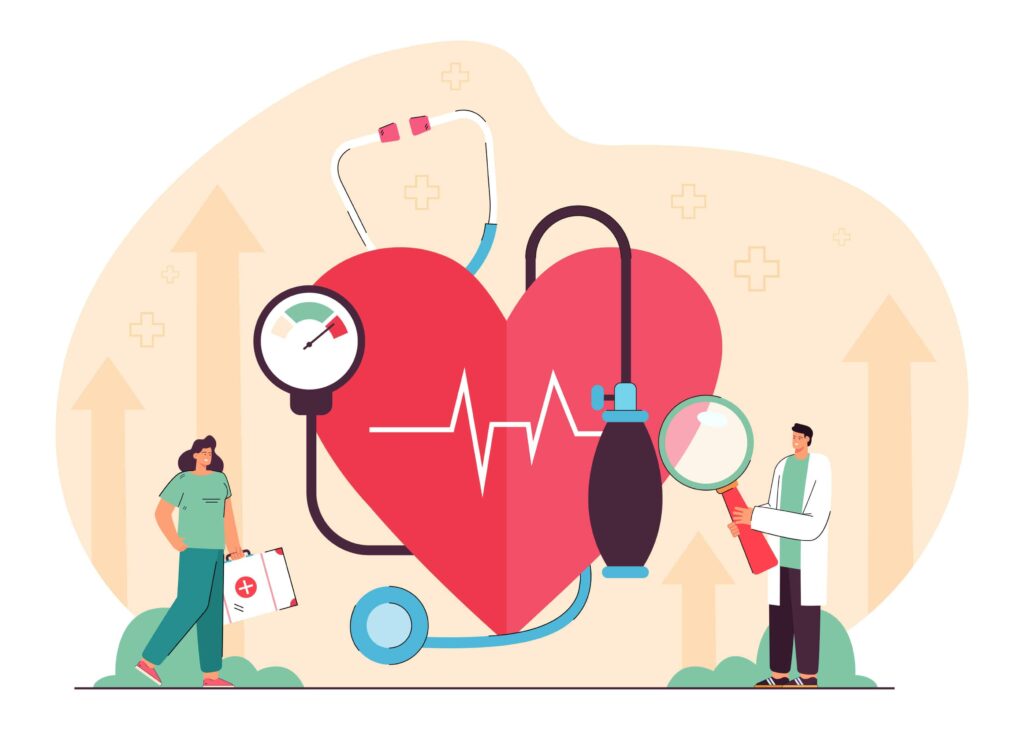Blood pressure is a critical indicator of cardiovascular health, influencing various bodily functions and overall well-being. However, it’s a subject often misunderstood or overlooked until complications arise. In this comprehensive guide, we’ll delve into the intricacies of blood pressure, covering its definition, measurement, factors influencing it, its significance, and strategies for managing it effectively.
What is Blood Pressure?
Blood pressure refers to the force exerted by circulating blood against the walls of blood vessels. It’s typically measured in millimeters of mercury (mmHg) and expressed as two numbers: systolic pressure (the pressure when the heart beats) over diastolic pressure (the pressure when the heart rests between beats). For instance, a reading of “120 over 80” mmHg indicates a systolic pressure of 120 mmHg and a diastolic pressure of 80 mmHg.
Understanding Blood Pressure Readings
Blood pressure readings fall into several categories:
- Normal: Systolic pressure below 120 mmHg and diastolic pressure below 80 mmHg.
- Elevated: Systolic pressure between 120-129 mmHg and diastolic pressure below 80 mmHg.
- Hypertension Stage 1: Systolic pressure ranging from 130-139 mmHg or diastolic pressure ranging from 80-89 mmHg.
- Hypertension Stage 2: Systolic pressure of 140 mmHg or higher, or diastolic pressure of 90 mmHg or higher.
- Hypertensive Crisis: Systolic pressure over 180 mmHg and/or diastolic pressure over 120 mmHg, requiring immediate medical attention.
Factors Influencing Blood Pressure
Several factors can influence blood pressure:
- Lifestyle: Diet high in sodium, low physical activity, excessive alcohol consumption, and tobacco use can elevate blood pressure.
- Genetics: Family history of hypertension increases the risk.
- Age: Blood vessels lose elasticity with age, contributing to higher blood pressure.
- Stress: Chronic stress can lead to elevated blood pressure levels.
- Medical Conditions: Conditions like diabetes, kidney disease, and sleep apnea can affect blood pressure regulation.
The Significance of Blood Pressure
Maintaining optimal blood pressure levels is crucial for overall health. High blood pressure (hypertension) can lead to serious health complications, including heart disease, stroke, kidney damage, and vision loss. Conversely, low blood pressure (hypotension) may cause dizziness, fainting, and organ damage due to inadequate blood flow.
Managing Blood Pressure Effectively
Several lifestyle modifications and medical interventions can help manage blood pressure:
- Healthy Diet: Adopt a diet rich in fruits, vegetables, whole grains, and lean proteins while limiting sodium, saturated fats, and added sugars.
- Regular Exercise: Engage in aerobic activities like walking, jogging, cycling, or swimming for at least 150 minutes per week.
- Weight Management: Maintain a healthy weight through a balanced diet and regular exercise to reduce strain on the cardiovascular system.
- Limit Alcohol and Caffeine: Moderate alcohol consumption and limit caffeine intake, as excessive amounts can elevate blood pressure.
- Stress Management: Practice relaxation techniques such as deep breathing, meditation, yoga, or mindfulness to reduce stress levels.
- Medication: In cases of hypertension, healthcare providers may prescribe antihypertensive medications to help lower blood pressure effectively.
Blood pressure serves as a vital marker of cardiovascular health, influencing overall well-being and longevity. Understanding the factors affecting blood pressure, interpreting readings accurately, and implementing appropriate lifestyle modifications are essential for preventing hypertension and its associated complications. By adopting a healthy lifestyle and working closely with healthcare providers, individuals can effectively manage blood pressure and reduce the risk of cardiovascular diseases, thus enhancing their quality of life.
Here we have listed common Questions & Answers about Blood Pressure.
Q: What Is High Blood Pressure?
Ans: Blood pressure rises and falls during the day. When blood pressure stays elevated over time, it is called high blood pressure or hypertension. Blood pressure is typically recorded as two numbers – the systolic pressure (as the heart beats) over the diastolic pressure (as the heart relaxes between beats). A consistent blood pressure reading of 140/90 mm Hg or higher is considered high blood pressure, another term for hypertension.
Q: What is systolic blood pressure?
Ans: Systolic pressure is the force of blood in the arteries as the heart beats. It is shown as the top number in a blood pressure reading. High blood pressure is 140 and higher for systolic pressure. Diastolic pressure does not need to be high for you to have high blood pressure. When that happens, the condition is called “isolated systolic hypertension,” or ISH.
Q: What is diastolic blood pressure?
Ans: Diastolic pressure is the force of blood in the arteries as the heart relaxes between beats. It’s shown as the bottom number in a blood pressure reading. The diastolic blood pressure has been and remains, especially for younger people, an important hypertension number. The higher the diastolic blood pressure the greater the risk for heart attacks, strokes and kidney failure. As people become older, the diastolic pressure will begin to decrease and the systolic blood pressure begins to rise and becomes more important. A rise in systolic blood pressure will also increase the chance for heart attacks, strokes, and kidney failure. Your physician will use both the systolic and the diastolic blood pressure to determine your blood pressure category and appropriate prevention and treatment activities.
Q: Why Is High Blood Pressure Important?
Ans: High blood pressure is dangerous because it makes the heart work too hard. It also makes the walls of the arteries hard. High blood pressure increases the risk for heart disease and stroke, the first- and third-leading causes of death for Americans. High blood pressure can also cause other problems, such as heart failure, kidney disease, and blindness.
Q: What Causes High Blood Pressure?
Ans: The causes of high blood pressure vary. Causes may include narrowing of the arteries, a greater than normal volume of blood, or the heart beating faster or more forcefully than it should. Any of these conditions will cause increased pressure against the artery walls. High blood pressure might also be caused by another medical problem. Most of the time, the cause is not known. Although high blood pressure usually cannot be cured, in most cases it can be prevented and controlled.
Q: How do I know if I have high blood pressure?
Ans: High blood pressure often has no signs or symptoms. The only way to find out if you have high blood pressure is to be tested for it. Using the familiar blood pressure cuff, your doctor or nurse can easily tell if your blood pressure is high.
Q: How Is Blood Pressure Tested?
Ans: Having your blood pressure tested is quick and easy. Blood pressure is measured in millimeters of mercury (mm Hg) and recorded as two numbers systolic pressure “over” diastolic pressure. For example, the doctor or nurse might say “130 over 80” as a blood pressure reading. Both numbers in a blood pressure reading are important. As we grow older, systolic blood pressure is especially important.To test your blood pressure, your doctor will use a familiar device with a long name. It is called a sphygmomanometer (pronounced sfig’-mo-ma-nom-e-ter), and may look something like this.



